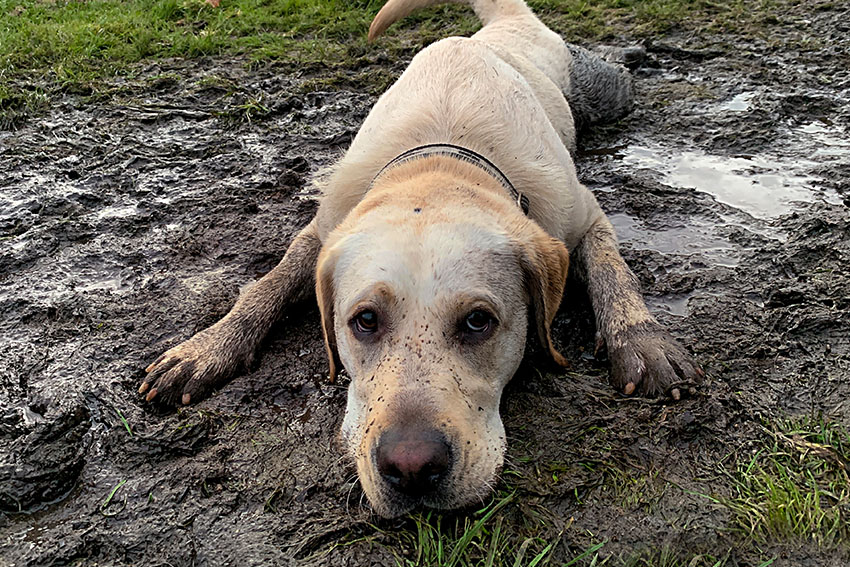How to Mitigate the Spread of Giardia in Your Yard: Portland-Style

Portland’s winters, with their relentless rain and muddy backyards, create more than just messy footprints. For pet owners, these conditions can foster a serious health risk—Giardia, a microscopic parasite that thrives in cool, damp environments. Left unchecked, dog waste in wet yards becomes a breeding ground for Giardia cysts, posing risks to pets, families, and local ecosystems.
This article will explain what Giardia is, how it spreads, the health risks it poses (particularly to vulnerable groups like children), and what steps you can take to keep your yard clean and your loved ones safe.
What is Giardia and Why is it Dangerous?
Giardia is a parasite that causes giardiasis, an intestinal infection that leads to diarrhea, abdominal pain, nausea, and dehydration. The primary species affecting humans and pets is Giardia intestinalis (also known as Giardia lamblia).
The Giardia Life Cycle:
- Cyst Stage: The infectious form of Giardia, resistant to environmental conditions.
- Trophozoite Stage: Once ingested, cysts transform into trophozoites in the intestines, where they multiply and cause infection.
- Infected pets or humans excrete cysts in their feces, contaminating the environment and perpetuating the cycle.
Giardia is one of the leading causes of waterborne illness worldwide, especially in areas with wet, unsanitary conditions—like muddy backyards during Portland’s rainy season.
How Giardia Thrives in Wet, Cool Environments
Portland’s climate is ideal for Giardia cyst survival. Here’s how the parasite persists in different conditions:
Dog Feces:
- In moist, cool environments, Giardia cysts can survive for several weeks.
- In cold temperatures (around 4°C or 39°F), cysts remain viable for up to 7 weeks.
- At room temperature (25°C or 77°F), survival drops to about 1 week.
Soil:
- Contaminated soil can harbor Giardia for weeks, especially in damp, muddy conditions.
Water:
- Giardia cysts persist for 1–3 months in cold water (below 10°C or 50°F).
- In warmer water (above 37°C or 98.6°F), survival drops to less than 4 days.
For pet owners in Portland, this means leaving dog waste in the yard—even for a short time—creates an environment where Giardia thrives and spreads.
How Giardia Spreads in Your Outdoor Space
Giardia transmission occurs through several pathways, and wet, contaminated environments increase the risk:
Contaminated Water Sources:
- Dogs may drink from puddles, lakes, or communal bowls shared with infected pets.
Direct Contact with Infected Feces:
- Giardia cysts are shed in feces, contaminating yards, dog parks, or communal spaces.
- Muddy yards, where waste isn’t promptly removed, become hotspots for infection.
Fecal-Oral Transmission:
- Giardia spreads when humans accidentally ingest contaminated soil, water, or surfaces.
- Poor hygiene after handling pet waste increases the risk—especially for children who play outdoors.
Tracking Contamination Indoors:
- Muddy shoes and paws can carry Giardia cysts into the home, where surfaces become contaminated.
Health Risks of Giardia: Who’s Most Vulnerable?
While anyone can contract giardiasis, certain groups face higher risks of severe symptoms and long-term effects:
Children:
- Children are particularly susceptible due to frequent contact with contaminated soil and poor hygiene habits.
Health Impacts:
- Acute diarrhea, abdominal pain, and dehydration.
- Chronic infections can lead to nutritional deficiencies and stunted growth.
- Long-term cognitive and developmental delays are linked to persistent giardiasis.
Older Adults:
- Older adults with weakened immune systems may experience prolonged symptoms and complications.
Risks Include:
- Dehydration due to chronic diarrhea.
- Malabsorption of nutrients leading to muscle weakness (e.g., hypokalemic myopathy).
Pets:
- Infected dogs may show symptoms like diarrhea, weight loss, and fatigue.
- Pets with mild infections can still shed Giardia cysts, contaminating the environment.
Long-Term Effects of Giardia in Children
Untreated giardiasis can have lasting consequences for children, including:
Nutritional Deficiencies:
- Chronic diarrhea leads to poor nutrient absorption, resulting in malnutrition and failure to thrive.
Stunted Growth:
- Prolonged infections impair physical growth and weight gain.
Cognitive Impairments:
- Developmental delays and reduced learning abilities.
- Studies show links between early childhood diarrhea and long-term deficits in cognitive function.
Gastrointestinal Disorders:
Post-infectious issues like irritable bowel syndrome (IBS) and lactose intolerance.
Recurrent Infections:
- Children in environments with inadequate cleanup are at higher risk for reinfection, exacerbating health challenges.
Strategies to Mitigate Giardia in Your Yard
Preventing Giardia requires consistent, proactive measures to keep outdoor spaces clean and safe:
Prompt Cleanup of Dog Waste:
- Remove dog feces immediately to prevent the spread of Giardia cysts.
- Wet conditions accelerate contamination—never leave waste unattended.
Safe Hygiene Practices:
- Always wear gloves when handling pet waste.
- Wash hands thoroughly afterward.
- Encourage children to wash hands after playing outside.
Disinfect Contaminated Areas:
- Use effective disinfectants such as quaternary ammonium compounds to kill Giardia cysts.
- For small areas, pour boiling water over contaminated spots.
- Regularly sanitize pet zones, muddy pathways, and high-traffic outdoor spaces.
Prevent Contaminated Water Exposure:
- Avoid letting dogs drink from puddles, lakes, or communal water bowls.
- Provide clean, fresh water at all times.
Regular Veterinary Care:
- Schedule routine checkups to test for and treat Giardia infections in pets.
- Follow veterinary guidelines for deworming and parasite prevention.
Protect Your Family and Pets
Eliminate the risks of Giardia and other harmful pathogens to create a safe, healthy outdoor space.
Portland’s wet winters create ideal conditions for the survival and spread of Giardia, turning contaminated dog waste into a serious health hazard for pets and families. The cool, damp environment allows Giardia cysts to persist for weeks, spreading through water, soil, and direct contact.
Protecting your loved ones starts with proactive waste management: prompt cleanup, proper hygiene, disinfection, and professional pooper scooper services.
Sources
https://pmc.ncbi.nlm.nih.gov/articles/PMC10373467/
https://snoutsnstouts.com/health-and-wellness/giardia-in-dogs/
https://globalhealth.unc.edu/2024/01/understanding-giardia-lamblia-in-children-from-low-and-middle-income-countries/
https://pmc.ncbi.nlm.nih.gov/articles/PMC3870550/
https://bestfriendsvet.com/library/giardia/
https://medlineplus.gov/giardiainfections.html

